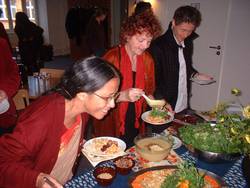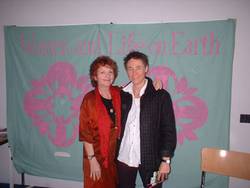Menu

Women and Globalization
Gender and global corporatization
"While the power wielded by giant corporations and its resulting extremes of wealth and poverty are unprecedented in scale, the world-view that supports it reaches back between five and 10 millennia..." From Gender and Global Corporatization by Molly Morgan, Virginia Rasmussen & Mary Zepernick.
This article on women and corporate control of the world economy, with many links, is reprinted from Defying Corporations, Defining Democracy (2001), pp. 184-186.
For this book and more information on corporate control and related issues see: the Program on Corporations, Law & Democracy
Women, Globalization & Migration:
"Economic globalization has put a new spin on global migration, causing global uprootedness and human displacement on an unprecedented scale. Because economic globalization exacerbates the inequalities between nations, migration for many becomes not a choice, but an economic necessity."
"So long as women earn more from housecleaning and childminding overseas than from teaching in their homeland, they will tend to set off and leave their own country and children behind." Christa Wichterich
-- see information at Women & the Economy website
16 October 2003, ÔÇ£World Food DayÔÇØ, Berlin
Women and Life on Earth invited three international activists visiting Berlin to a discussion on current issues around women and globalization.
Here (see picture rights) they are enjoying our World Food Day vegetarian buffet:
Farida Akhter (Bangladesh), Renate Klein and Susan Hawthorne (Australia)
Their comments follow.
Susan Hawthorne

Susan is an activist, writer, circus performer and co-founder - with Renate Klein - of Australia's feminist Spinifex Press.She is the author of Wild Politics: Feminism, Globalisation and Bio/diversity (2002) and co-editor of an international anthology of feminist responses to September 11 September 11, 2001: Feminist Perspectives (2002). She has written and contributed to many other publications. Her most recent work has been on lesbian culture and the torture of lesbians which persists in many countries.
(ÔǪ)"In writing my book I was really inspired by numbers of different women who were writing things that challenged my perception, ideas that made me think differently. What I started with was the idea of the ÔÇÿwild type.ÔÇÖ And I thought of that both as a concept in genetics, but also as a social concept. So that feminists are ÔÇÿwild typesÔÇÖ ÔÇô weÔÇÖre the irritants, weÔÇÖre the political and social reminders that things need to be different. Artists also play that role as do other people on the margins, outside the dominant culture.
So what I came to, in terms of thinking about the world, is that we need something so different -- we need to really turn it over -- and in doing so we need to move from a society motivated by profit, to a society that is inspired by biodiversity.
Because if we are inspired by biodiversity, that is where our conceptualisation begins. For a start it deals with a whole lot of problems immediately. It gets rid of biotechnology which is inconsistent with biodiversity; it gets rid of war which destroys not only human environments but nature is also poisoned. It gets rid of the idea that you can just produce things because they make money or because they are popular with an American consumer or that they are a passing and fashionable thing. So in that sense it seemed to undermine the capitalist project. The other connection is the way in which womenÔÇÖs work is structured quite differently from most menÔÇÖs work. That is, ÔÇÿmost women and most menÔÇÖ in most of the world have work that is structured differently because of their sex. Women in the Pacific fish, but their fishing is not counted because it is mostly for domestic use. Men who fish use petrol in motor boats and sell their catch at the end of the day. The occupation is the same, but men fish while women donÔÇÖt. The same is true of farmers in much of the world. Women farm in ways that maximise biodiversity and sustenance, while menÔÇÖs farming tends to focus on cash crops and export.
Most of us are concerned in some way or another with the whole sense of continued being, sustenance ÔÇô whether that is in an emotional and caring sense, or ÔÇÿfeeding the familyÔÇÖ or maintaining the local environment, whether thatÔÇÖs a household, or fields or forests or whatever. And so there are a whole lot of other elements in there that bring women together at different stages of our lives.
Another thing I found important was the notion of ownership, and what we have in the global world at the moment is increasingly privatization and increasing cutting up into smaller and smaller parts of ownership, (such as patents) but also massive ownership. So that in the smaller bit it is ownership of parts of the body, molecular colonisation, and this is also reflected in ownership of active ingredients in plants. In the massive ownership, it is big corporations that are buying up huge areas of land and products and so on and so forth.
And in terms of challenging that, I know that amongst many indigenous people, the idea of ownership ÔÇô it just is not an idea! It is , rather, that there are places that people come from and people live in, and they are in relationship to that place and they are responsible for that place. And any ÔÇô I donÔÇÖt like the term ÔÇô but any ÔÇÿrightsÔÇÖ they have over that land, they have only because they have responsibilities also. This is the practise of Indigenous peoples in Australia, and is maintained as an ongoing system in Indigenous communities. So that for me is a big challenge to the whole sense that one can own anything really. It is more like a tenancy on land. Occupation involves responsibility. Of course you canÔÇÖt institute that sort of thing overnight, you have to change peoplesÔÇÖ heads.
Finally I wrote about patents and international trade rules. I never thought I would be excited by international trade rules, but Ive become really obsessive. What has been happening in Australia in the last nearly 12 months is a proposal to have an Australia - US Free Trade Agreement, which is really bad news. It would effectively turn Australia into another state of America. We already have Canada and Mexico within NAFTA (North American Free Trade Agreement), and by 2005 all of South America will join in as well through the FTAA (Free Trade Area of the Americas). The result will be the dismantling of social services such as health, education and welfare programs. It also threatens Australias biodiversity as quarantine rules are considered by the US government as a barrier to free trade. This in a country where rabbits, cane toads, European bees and non-native plants such as lantana have already wrecked havoc with the environment. It will make it easier to introduce GM crops, increase monoculture farming with the result of increased soil salinity. But the biotechnology companies see salinity simply as a new business opportunity, one that allows them to develop salt resistant plants to fill the gap created by their failure."()
Renate Klein

Renate Klein moved from Switzerland to Australia in 1987 to take up a postdoctoral fellowship at Deakin University and later a position in Women's Studies, where she is an Associate Professor. Renate was one of the founders of FINRRAGE and of the journal Issues in Reproductive and Genetic Engineering. Her many writings include the classic work Theories of Women's Studies, co-edited with Gloria Bowles and Test-Tube Women: What Future for Motherhood? (1984) with Rita Arditti and Shelley Minden. Her latest books look at relationships between women and animals.
"I keep looking at your wonderful banner: ÔÇ£Women and Life on EarthÔÇØ, which is really fantastic. And I remember that 25 years ago, when these new reproductive technologies started, and the birth of Louise Brown in England in 1978 was announced as this miracle baby, some of us feminists asked ourselves if this was a good thing, if it could perhaps benefit women -- and which women -- or whether there dangers in it.
I am a biologist by training, and was living in London at the time. So quite naively, I have to say, I started to put together a book called ÔÇ£Test-tube Women: What Future for Motherhood?ÔÇØ which was then translated into German quite quickly as ÔÇ£Retortenm├╝tter.ÔÇØ The book, an anthology, asked questions more than it gave answers. But already, in putting the book together, we thought: ÔÇ£Ohhh, we have a PandoraÔÇÖs box here.ÔÇØ Because once you start looking these technologies in the mouth, you see a lot of foul teeth here.(ÔǪ)
The 1980s were a good time, because the book ÔÇ£Retortenm├╝tterÔÇØ came out in German, and Gina CoreaÔÇÖs book also came out in 1985: ÔÇ£Die M├╝ttermachineÔÇØ ÔÇô the Mother Machine. And then some wonderful German women organized the Frauen Gegen Gene- und Reproduktionstechnologie conference in Bonn. And that was really important because some of us had been in Gr├Âning in 1984, and had had a panel there at a womenÔÇÖs congress called ÔÇ£The Death of Women?ÔÇØ (with a questionmark). And there were so many women at our talk, 500 or 600 women, that we said we need an international network to fight against these technologies.
And then together with this extraordinary conference, there were these huge masses saying: ÔÇ£These technologies are dangerous, we need to put a stop to them.ÔÇØ In the same year, also in 1985, we had an emergency conference in Sweden where Maria and some other German women convinced us that we had to change our name to FINNRAGE (Feminist International Network for Resistance Against Reproductive and Genetic Engineering). We knew this was the end of grants: if you have ÔÇ£rageÔÇØ in your title nobody will give you money. But we had to include ÔÇÿrageÔÇÖ, because that was the genetic engineering part as well. It wasnÔÇÖt just about reproductive technologies for women, it was also the genetic engineering.(ÔǪ)
So I think FINNRAGE became very successful because we always had both sides of the coin. We had the new reproductive technology and we had the old reproductive technology. And really, what we found was that there were a lot of common assumptions.()
The fallacy in both of these approaches is that as far as the new reproductive technology, that was only the disguise, the idea that if you sell it as something to do some good for people who are desperate, you can then actually industrialize the whole notion that life can be separated ÔÇô a womanÔÇÖs body ÔÇô can be separated into eggs and wombs, and they can be used interchangeably. Hence then we had surrogacy (ÔÇ£LeihmutterschaftÔÇØ) without any problems.
But also, most importantly, you then had access to egg cells outside a womanÔÇÖs body. And you could play with the egg cells. And if it had not been for ÔÇ£RetortenbefruchtungÔÇØ (test tube fertilization), we would never have the research we are faced with now: stem cell research and cloning. It was only possible because women let themselves be opened under the guise of ÔÇ£we want itÔÇØ, giving the reproductive technologies access to egg cells.
We said at the beginning, that if this development continues, we would see incredible inequalities. We will see further domination of who controls which women in the world, who can give birth to what sort of children, how many, by whom, and especially where in the world are they allowed to. We have certainly seen that development going further and further, and I know in Germany you now have this discussion whether PRD, prenatal diagnosis, will be allowed. In other countries, like Australia or England, it has already come. In other words, whether actually an embryo, any embryo, can be checked for chromosomal abnormalities, and if its not deemed good enough, can be selected out. We always stressed from the beginning that this was really eugenics in a new guise.()
In fact, if I have one surprise, it is that (there has not been more research done on artificial wombs) since 1994, when in some laboratory in Japan scientists constructed an artificial womb, into which they put a goat embryo. They let this embryo develop, and then declared that yes, it was now developed enough to be birthed, to be taken out. It was alive, and they said: Ha, we now have an ectogenesis, we have an artificial womb. The goat died but if there is anything that surprises me it is that (this kind of research) has not continued further. Because until the artificial womb is constructed, women will still be needed, womens bodies will still be needed."
Farida Akhter

Farida is a founder and Executive Director of UBINIG, Policy Research for Development Alternative, a leading Bangladeshi NGO which has played a crucial role in the creation of a social, political and cultural movement that includes 50,000 farmers across Bangladesh. Farida is an expert on agricultural and genetic engineering and believes that agribusiness and biotech companies destroy the genetic diversity of seeds. She is active in the womenÔÇÖs movement and several international networks, including FINNRAGE (Feminist International Network of Resistance to Reproductive and Genetic Engineering), SANFEC (South Asia Network on Food, Ecology and Culture) and the South Asian Network against the Trafficking of Women and Children.
()"And now, in 2003, the things that people are talking about, we said that back in the early 1980s, 1984-85. And our 1989 conference in Comilla, Bangladesh was our highest moment, when we were prepared to have a joint declaration, of women from the North and South, and in a country in the South. That was really significant, where it was placed. In the countryside.()
I will give you a few ideas the kind of work we have been doing in Bangladesh and also the link to globalization. I think that population control was one of the first very clear example of globalization we felt and resisted. It is racism globalized by which global elite is acting to terminate the people they consider ÔÇÿunwantedÔÇÖ and disposable. It was called the birth control movement or family planning, or population control. But it was nothing but the business of the corporations, for their contraceptives. So globalization has a much longer history than we think that it has. And nowadays, contraceptives are still being tested on womenÔÇÖs bodies and marketed in womenÔÇÖs bodies. They are being privatized, with the largest amount of money going to a social marketing project, which is trying to privatize & commercialize the contraceptives. They create conditions for women to take it, and then make them buy itÔǪ
Another thing that is happening concerns the garment industry. Almost 1.8 million women are employed in the garment industry, making readymade clothes. With the phasing out of the multi-fiber arrangement, which gives quotas for the European and U.S. markets, 50 percent of the garment industry companies are in danger of being closing down, because they may not be able to face the competition in the international market. So many women will lose their jobs.
But what is happening is more interesting, and it is not necessarily about the multi-fiber arrangement. Because already we can see that, garment factory owners donÔÇÖt want women over 30 years of age. That is because these women canÔÇÖt see as much, because they have had to work with an electric machine and their eyesight is already affected. They have back pain. So they are not as efficient as they could be before. So whatever happens in the international market, women over 30 are going to lose their jobs in the garment factories anyway. The garment factories are not going to be an answer (to employment problems) to these women seeking employment. Even the garment workers are feeling that way. They are trying to work on their own.
Another matter of concern is that UNFPA, the population fund of the UN, is having a reproductive health project with the Bangladesh Garment Manufacturers & Exporters Association (BGMEA). They give injections, and say that they are providing medical support to the garment factory workers. And in fact what they are doing to these very young girls, is that they are giving injections, saying that they will remain healthy, so that they donÔÇÖt menstruate, because that causes disruption in the production cycle. And also, we donÔÇÖt know what is happening in these so-called reproductive health programmes. They are giving injections perhaps contraceptives ÔÇô but they donÔÇÖt say that. What they say is that the injections are about remaining healthy and stopping the menstruation. That, it will be very good for these woman. Since the garment workers are not even allowed to have weekly holidays, any other disruption in their work should also be stopped. This is the basic principle of the employers.
This is another example of colonization of womenÔÇÖs bodies. They are cheap labor, they have been exploited in many ways, and now their whole reproductive life is controlled. Once a young woman enters in garment factories, she is not allowed to get married, she is not even allowed to have a baby. Anyway, these women are supposed to be quite free, they can take their own decisions. So they are technologically controlled.
I must mention about trafficking in women and children. This is another face of globalization. One cannot imagine the selling of women, or their body parts. For example, many women go to the hospitals and their uterus is removed, for simple gynecological problems. There are many gynecological problems. We did a study in the gynecological wards in the hospitals, and found that 90 percent of women coming with some kind of problems, who had at least two or three children, had hysterectomies. A common operation. Even for poor women. But without their knowledge. And we hear that these uteruses are sold, for medical research. But we dont know where they go. They say that the tissue is very important for medical research that they dont get from anywhere else. And also the fetus. Many women have abortions, and the fetus is also very important raw material for research. So those things are happening, and I am sure they are part of the organ trade.()
We held a South Asia Court of Women just in August, this year (2003). At least 1500 women attended. We had 40 testimonies from different parts of the South Asian region, and you know people only cried, while listening to what had happened to them.()
Another aspect of globalisation is agriculture. That is a place where we have really not worked very much as feminists. You know now, we are realizing that it is really late, and that a lot of piracy has happened. Women were the main seed savers. I think even in Germany and all over the world, women were the main seed savers. And now in our new agriculture movement , Nayakrishi Andolon, we are trying to get back control of seeds. This year we could cultivate 2,000 varieties of rice in this season. Because women have kept varieties on their own, and even in small plots of land, they have regenerated. But the main focus of the government is on the hybrid variety, which is what you have to get from the market. But the seed is very important, and when I see this Safe Seeds Campaign, I am happy. That is very important.
And the poultry. Women used to keep and breed local chickens. Now they are giving white chicken, through micro-credit programs. If you take micro-credit, you have to take a particular foreign variety of hen. Women dont want it. Because these hens cannot look after their chicks. You know the crows take them, and the hen cant save their chicks. But our local variety hen can do that. We have collected 40 different varieties of hen and cocks. And if you see them, some legs are different  white, yellow, black  you know different kinds. And they have different food patterns, eating habits, they give different amounts of eggs. You know they are different
Australia has an agreement with Bangladesh that we will grow corn for the poultry farms in Australia in our paddy fields. And also the chickpea, black gram, that they are modifying. Genetically modified crops, they are now trying to promote in Bangladesh, which we are really resisting. Today is World Food Day, (16th October) and we are protesting all over Bangladesh today against GM food. There will be rallies all over Bangladesh.
About the piracy of traditional knowledge. You know about the uncultivated food the knowledge that women have, of the herbs, the plants, the medicinal values, all these knowledge are being taken away. Many anthropological studies that were done in Bangladesh and  these became the source of pirating traditional knowledge.
We are now having a debate in South Asia, about whether the traditional knowledge should be documented, in writing. Our position should be that we will practice it. That we should be practicing it more and more, and that it should be in the real lives of people, instead of just being found in books.
The last thing I want to mention is water. Currently, water is being privatized. In India, companies such as Coca-Cola are taking over ÔÇô, they need water now ÔÇô they are taking over rivers. And river privatization means that you canÔÇÖt even take a bath. The boatmen cannot even use their boats in the river. The fishing communities cannot go there to fish. They take away the rights of all the people. I think many governments have signed agreements with the European Union, under GATS (General Agreement on Trade in Services). These are done in a very secretive way. So the GATS is again one of our issues that we have been protesting. We had a rally of over 5,000 people on the 10th of September, which was the first day of the WTO meeting in Cancun. We protested against privatisation of services. We protested against GATS. So we are busy doing all these." (end)



